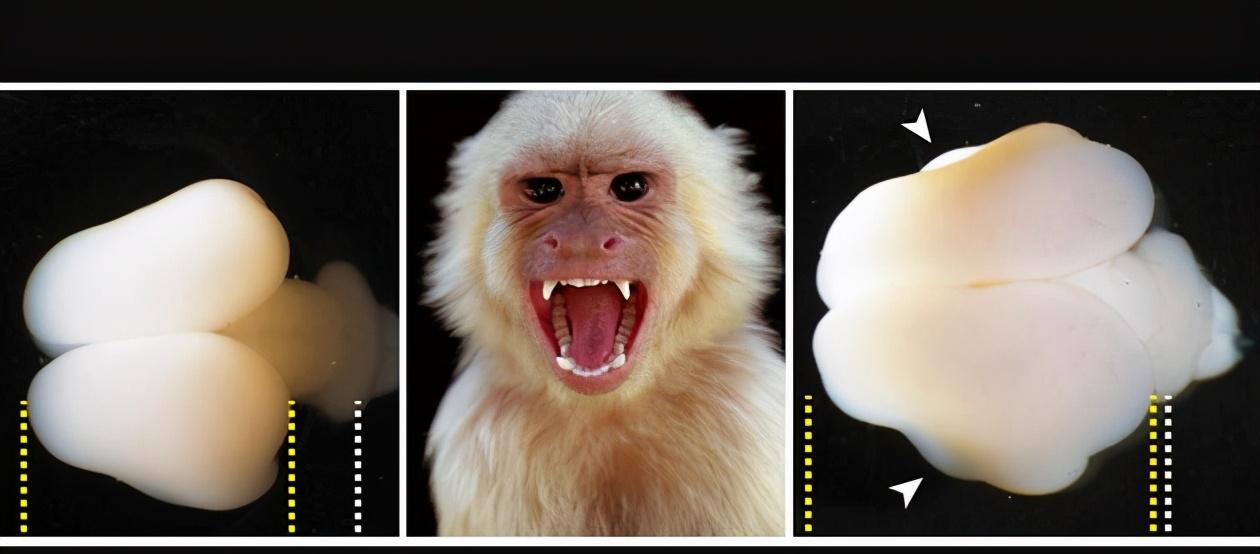An experiment heralds a real version of planet apes that could become a reality! The scientists implanted human genes into monkey embryos and found that the size of the monkey's brain was significantly increased, and the monkey embryo's brain function was normal.
Scientists from the Max Planck Institute for Molecular Cell Biology and Genetics in Germany and the Central Institute of Laboratory Animals in Japan conducted a special experiment in which they implanted a special human gene "ARHGAP11B" into ordinary marmoset embryos, and the results showed an enlarged neocortex of their brains. They reported the major discovery in the journal Science.

Scientists implanted the human gene ARHGAP11B into monkey fetuses and found that the gene caused the monkeys' brains to increase in size, including an increase in cortex folds similar to the human brain. However, the study raises serious ethical questions about genetic engineering.
The neocortex of the brain is a new part of the evolution of the human brain, which occupies more than 75% of the human brain, and is related to human reasoning, language and other cognitive abilities, and it is precisely because of the existence of the neocortex of the brain that human beings are "unique" in nature.
Shortly after their ancestors branched from their close chimpanzee evolutionary tree, their brain size underwent rapid expansion, increasing nearly 3-fold in human brain size over 3 million years. The volume of the primitive human brain grew so fast that the slowly evolving skull became tighter and narrower, leading to the appearance of visible neocortex folds of the brain.
Scientists believe that this is the end result of many evolutionary factors, but the expression of the ARGHAP11B gene unique to primitive humans may have promoted the brain development of our ancestors, who were close relatives of Neanderthals and Denisovans, who gradually disappeared in the course of human evolution.
Previous studies have shown that the unnatural expression of the ARGHAP11B gene in mice and ferrets also leads to an enlargement of the neocortex of the brain. However, this is the first time the gene has been experimented with non-human primate bodies with human-grade gene expression capabilities, further suggesting that the gene has played a key role in human evolution.
Here is a comparison of two marmoset monkey brains at the same stage of development. The left panel is the brain of a normal monkey, while the right is the brain of a monkey carrying the human ARHGAP11B gene.
The ARGHAP11B gene appeared in human ancestors about 5 million years ago, when a "small accident" occurred, and the gene was a ubiquitous copy of the ARGHAP11A gene. In an evolutionary error, one nucleotide base (the molecule encoding DNA) was replaced by another, causing the ARGHAP11B gene to lose 55 nucleotides. Just as a computer reads the wrong code, this variation causes neuronal cells in the brain to generate more cells on their own for a long time, leading to an enlargement of the brain's neocortex.
According to study leader Michael Heide, we did find that the neocortex of the brain of the common marmoset monkey became larger, folds appeared on the surface of the brain, and its cortical surface became thicker.
"In addition, we can see an increase in the number of external basal radial glial cells in the subventricular region, as well as an increase in the number of neurons in the upper layers, which gradually increase over the course of primate evolution," he said. ”
Wieland Huttner, co-author of the study, said it was irresponsible and unethical to let monkey embryos pass through the fetal period in genetically modified experiments, resulting in the birth of monkeys carrying human genes. Pictured here is a promotional poster for the science fiction movie Rise of the Apes.
Scientists call these monkey hybrids "genetically modified non-human primates," which may be enough to sound the alarm bell of the end of the human race, and experiments with primates will certainly raise many ethical questions, not to mention the introduction of human genes into other animal bodies.
Therefore, the researchers' experiments were limited to monkey embryos, which were grown in the female monkeys for 100 days and removed by laparotomy. Wieland Huttner, co-author of the study, said it was irresponsible and unethical to let monkey embryos pass through the fetal period in genetically modified experiments, resulting in the birth of monkeys carrying human genes.
"Our analysis was limited to marmoset fetuses because we expected this human-specific gene expression to affect their brain neocortex development, and given the possible unforeseen consequences of brain function after birth, we considered it a prerequisite and ethically mandatory, starting with determining the effect of the ARHGAP11B gene on neocortex development in the fetal brain of marmosets," Hettner said. (Ye Qingcheng)